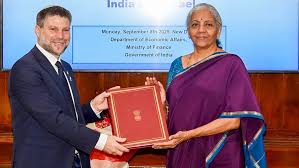
Israel, India Seal Bilateral Investment Agreement

 :
| Updated On: 09-Sep-2025 @ 12:59 pm
:
| Updated On: 09-Sep-2025 @ 12:59 pmSHARE
Israel’s Finance Minister Bezalel Smotrich and India’s Finance Minister Nirmala Sitharaman signed a landmark Bilateral Investment Agreement (BIA) in New Delhi on Monday. The pact is expected to boost reciprocal investments and deepen the already strong economic relationship between the two nations. It marks Israel as the first member state of the Organisation for Economic Co-operation and Development (OECD) to sign such an agreement under India’s new model for investment treaties, highlighting the strategic importance India attaches to its economic engagement with Israel.
The new agreement aims to provide greater certainty and protection for investors from both sides, thereby facilitating larger and more secure investment flows. It is expected to contribute significantly to the expansion of bilateral trade and investment across multiple sectors. The BIA replaces the previous investment treaty signed in 1996, which was later terminated in 2017 when India undertook a broad policy review of its international investment treaties to align them with evolving domestic and global requirements.
Smotrich led a high-level delegation from Israel that included senior officials from the Finance Ministry and the Israel Securities Authority. Among them were Director General Ilan Rom, Chief Economist Dr. Shmuel Abramzon, Accountant General Yahli Rothenberg, and Seffy Zinger, Chairman of the Israel Securities Authority. The delegation’s visit was aimed at advancing a range of economic collaborations and strengthening institutional ties with their Indian counterparts.
During the meeting, both Smotrich and Sitharaman underlined the depth of the economic partnership between India and Israel, noting that it is rooted in shared strategic interests. The ministers emphasized their countries’ commitment to enhancing cooperation in key areas such as innovation, infrastructure development, financial regulation, and the rapidly growing domain of digital trade. Furthermore, both sides agreed to collaborate more closely within the framework of regional development banks, opening opportunities for joint projects and financial cooperation at a broader international level.
In addition to finalizing the investment agreement, the two ministers also discussed the possibility of establishing a bilateral financial protocol, which would serve as a structured mechanism for future economic and financial collaboration. Smotrich extended an invitation to Sitharaman for a reciprocal visit to Israel, signaling both countries’ intent to maintain momentum in their partnership.
While Smotrich’s visit was focused on economic cooperation, his political background drew attention as well. A prominent member of Israel’s far-right Religious Zionist Party, the 45-year-old minister has often been in the spotlight for controversial statements. Earlier this year, he claimed that within six months the population of the Gaza Strip would be restricted to a narrow zone while the rest of the enclave would be “totally destroyed.” More recently, he proposed that Israel annex 82 percent of the West Bank, a move seen as a response to growing recognition of Palestinian statehood by several Western countries. These positions have generated international criticism and added political undertones to his economic diplomacy.
Nevertheless, the signing of the BIA reflects the pragmatic approach taken by India and Israel to separate political controversies from their economic engagements. For India, the deal represents a continuation of its policy of strengthening ties with strategically important nations through updated investment frameworks. For Israel, the agreement highlights an opportunity to expand trade, attract investment, and collaborate with one of the fastest-growing economies in the world.
In summary, the Bilateral Investment Agreement is a significant milestone in India-Israel relations. It not only replaces an outdated treaty but also opens new doors for investment, innovation, and financial cooperation. Despite Smotrich’s controversial political persona, the agreement demonstrates both nations’ commitment to prioritizing economic partnership and pursuing shared strategic and financial interests.